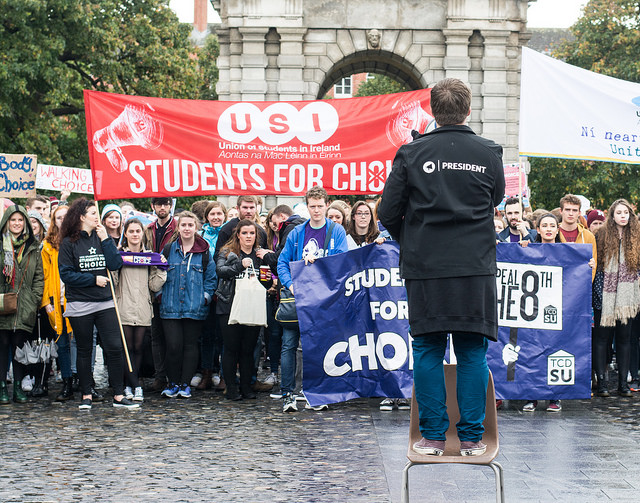With Trinity College Dublin Students’ Union (TCDSU) mandated to actively support repealing the eighth amendment of the Irish Constitution, calls have been made for the union to refrain from adopting positions on political issues for fear of excluding students with opposing views. Indeed, a group of Trinity students have contacted the legal firm Cormac O’Ceallaigh & Co Solicitors to consider their options in leaving TCDSU, as a result of its pro-choice stance. They are also supported by the Irish Students for Free Association, a group that advocates for voluntary membership of students’ unions in Ireland.
While this raises an important question about the right to dissociate oneself from a group, the right of TCDSU to engage with political issues is a right that must be vociferously upheld so that the will of students is coherently conveyed on a collegiate and national level. After all, the union only takes positions on issues that students have voted for. This is democracy in action. Frankly, the idea that students feel excluded as a result of those stances does not stand as a justification to ignore the will of the majority.
The union only takes positions on issues that students have voted for. This is democracy in action
However, let us consider the idea of volition regarding membership of the union. To do so, we must reflect on what it is to be a member TCDSU. With respect to Trinity’s students’ union, membership entails that the person is both a student of a higher education institution and, more specifically, a student at Trinity. While being a member of the union may imply that the person holds pro-choice views, it does not logically entail any such conclusion. The implication rests instead on probability, given that the majority of Trinity students voted in favour of a pro-choice mandate.
In spite of this, there remain many in Trinity who would identify as pro-life and there exists a diversity of opinion on the topic, as exists in any large grouping. In this sense, it is up to students who disagree with TCDSU’s positions to voice their objections. Since it can be uninviting for students who hold opposing viewpoints to voice their opinions, there is a clear duty on the union to foster an open forum for discussion, free from any harassment or exclusion. In this way, the union can live up to its potential as the centre for civic activity in student life, away from its stereotype as a refuge for wearied hacks and careerists.
Indeed, therein lies the promise of a politically engaged students’ union. Millennials are currently labelled a lazy apolitical generation, too occupied by the world of social media to get out and actively campaign for change. However, the effectiveness of youth mobilisation was evident during the 2015 marriage equality referendum, which had high youth engagement and turnout. Despite that success, as young people, we have been far less effective at making our voice heard in the fight against rising fees and deteriorating college standards – although last week’s march lends a certain degree of hope. At a time when Irish universities seem to be perpetually plummetting in world rankings and the government is reticent to increase public funding, it is vital that students and our interests are represented by a unified grouping.
There is strength in numbers, and a large grouping is the best way to draw political attention to improving the lives of students
There is strength in numbers, and a large grouping is the best way to draw political attention to improving the lives of students. Some will say that this is fine for student-specific issues and that TCDSU should avoid more polarising topics, such as abortion. However, firstly, any position the union takes is going to divide its members. For instance, there are even students who would want college fees to be raised. Secondly, the campaign to repeal the eighth amendment is a student issue insofar as it affects students’ lives, making it more of a student issue than marriage equality in this sense. Otherwise, students would not have signed a petition to call for a referendum on the matter, which was subsequently passed by 73 per cent of students who voted. Indeed, students participate in wider society and the right of women to control their own reproduction affects many Trinity students.
Students can and should be a force for progressive change in Irish society. From France’s student revolt of May 1968 to the more recent pro-democracy protests led by students in Hong Kong, there is a rich tradition of student activism being able to improve society. By having an active students’ union engaged in political campaigns, students can ensure their voice is heard. It is possible that some students may feel excluded as a result of these campaigns, but we cannot let that possibility override the democratic will of the majority. However, it is essential that there is a tolerant, inclusive forum where genuine discourse can take place. In this way, students will be better informed to make their mind up on issues and be less influenced by what’s deemed to be “fashionable”. Without a union, we are a disparate group of individuals. Together, we can be a political force. Let’s not waste that potential.







